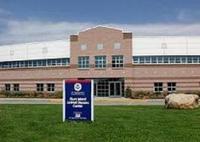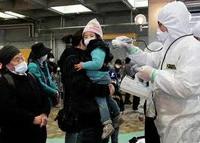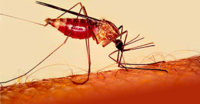-
Food prices in U.S., world set to rise as a result of drought
The U.S. Midwest is suffering the worst drought since 1956, and a total of 1,369 counties in thirty-one states across the United States have been designated for disaster aid; the prolonged drought will lead to an increase in food prices in 2013 as animal feed costs increase
-
-
Capturing CO2 directly from air is chemically, economically viable
With a series of papers published in chemistry and chemical engineering journals, researchers from the Georgia Institute of Technology have advanced the case for extracting carbon dioxide directly from the air using newly developed adsorbent materials
-
-
Pulling CO2 from air feasible, if still costly, way to curb global warming
Emerging techniques to pull carbon dioxide from the air and store it away to stabilize the climate may become increasingly important as the planet tips into a state of potentially dangerous warming; lower-cost technology is a stumbling block so far
-
-
New U.S. biodedfense R&D network launched
On Monday, Texas A&M System dedicated a new research center which is part of a national network of centers aiming to develop strategies and products to counter bioterrorism, chemical and radiological attacks on the United States, and better strategies to deal with pandemics; the network will have facilities in Texas, Maryland, and North Carolina; the Texas dedication is the culmination of a Manhattan Project-like program for biological countermeasures, launched in 2004 by the Department of Health and Human Services; the research network aims to develop “rapid, nimble and flexible approaches” to vaccine and therapy development, and train the next generation of professionals to sustain U.S. capabilities in these areas
-
-
Demystifying viruses' copying mechanism allows new vaccines for elusive viruses
Certain kinds of viruses such as those that cause the common cold, SARS, hepatitis, and encephalitis, copy themselves using a unique mechanism, according to researchers; the discovery sheds light on a previously identified, but never-before-understood region of an enzyme associated with the process of replicating genetic material
-
-
New rapid diagnostic test for pathogens, contaminants developed
Using nanoscale materials, researchers have developed a single-step method rapidly and accurately to detect viruses, bacteria, and chemical contaminants; the method could be used to detect pathogens and contaminants in biological mixtures such as food, blood, saliva, and urine
-
-
Police officers need sleep for health, performance
Forget bad guys and gunfire: Being a police officer can be hazardous to your health in other ways; a news study found that officers working the evening or night shifts were fourteen times more likely to get less restful sleep than day-shift officers, and also were subjected to more back-to-back shifts, exacerbating their sleep deficit – and that police officers who sleep fewer than six hours per night are more susceptible to a variety of health problems
-
-
Scaled-back Kansas biolab would meet U.S. needs

A report by the National Research Council says that it is “imperative” that the United States build a large-animal biocontainment laboratory to protect animal and public health; two options are acceptable: a $1.4 billion Biosafety Level 4 laboratory in Manhattan, Kansas, or a scaled-back Kansas lab tied to a distributed laboratory network in other facilities; a third option will not meet U.S. needs: maintaining current capabilities at Plum Island Animal Disease Center, because the Plum Island facilities do not meet current standards for high biocontainment
-
-
Calculating the global health consequences of the Fukushima nuclear disaster

Radiation from Japan’s Fukushima Daiichi nuclear disaster may eventually cause approximately 130 deaths and 180 cases of cancer, mostly in Japan; researchers have calculated; the estimates have large uncertainty ranges, but contrast with previous claims that the radioactive release would likely cause no severe health effects
-
-
Sustainability of infectious disease surveillance
Just as the globalization of trade and travel is rapidly evolving, so is the globalization of infectious diseases and the need for cooperative approaches to detect, prevent, and control them
-
-
Genetically engineered bacteria prevent mosquitoes from transmitting malaria

Malaria kills more than 800,000 people worldwide each year, many are children; researchers have genetically modified a bacterium commonly found in the mosquito’s midgut and found that the parasite that causes malaria in people does not survive in mosquitoes carrying the modified bacterium
-
-
Researchers discover a molecule's previously unknown role in fighting off E. coli
Escherichia coli (abbreviated as E. coli) are a large and diverse family of bacteria; most strains of E. coli are harmless, but some can be deadly; E. coli creeps into the food supply through contamination by tiny (usually invisible) amounts of human or animal feces; many people may develop mild symptoms, but some suffer severe complications that can lead to kidney failure and death; researchers discover a molecule’s previously unknown role in fighting off E. coli and other bacterial infections, a discovery that could lead to new ways to protect people from these dangerous microorganisms
-
-
Northrop Grumman's biodetection solution completes field test
Northrop Grumman says its Next Generation Automated Detection System (NG-ADS) for homeland defense applications has successfully completed a field test and is ready for the program’s next phase
-
-
Poultry vaccines found to combine into new viruses
Researchers found that two different vaccine viruses — used simultaneously to control the same condition in chickens — have combined to produce new infectious viruses, prompting early response from Australia’s veterinary medicines regulator
-
-
Environmental changes lead stressed cows in southern U.S. to produce less milk

Researchers found that the decline in milk production due to climate change will vary across the United States, since there are significant differences in humidity and how much the temperature swings between night and day across the country; for instance, the humidity and hot nights make the Southeast the most unfriendly place in the country for dairy cows
-
More headlines
The long view
We Ran the C.D.C.: Kennedy Is Endangering Every American’s Health
Nine former leaders of the Centers for Disease Control and Prevention (CDC), who served as directors or acting directors under Republican and Democratic administrations, serving under presidents from Jimmy Carter to Donald Trrump, argue that HHS Secretary Roert F. Kennedy Jr. poses a clear and present danger to the health of Americans. He has placed anti-vaxxers and conspiracy theorists at top HHS positions, and he appears to be guided by a hostility to science and a belief in bizarre, unscientific approaches to public health.
